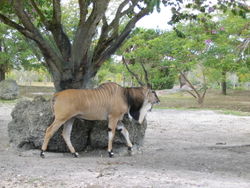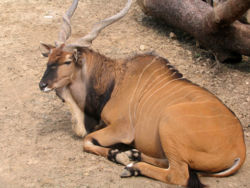Giant Eland
2007 Schools Wikipedia Selection. Related subjects: Mammals
| iGiant Eland | ||||||||||||||||
|---|---|---|---|---|---|---|---|---|---|---|---|---|---|---|---|---|
 |
||||||||||||||||
|
|
||||||||||||||||
 Endangered (EN) |
||||||||||||||||
| Scientific classification | ||||||||||||||||
|
||||||||||||||||
|
|
||||||||||||||||
| Taurotragus derbianus Gray, 1847 |
The Giant Eland (Taurotragus derbianus also known as the Derby Eland) is an open forest savannah antelope. It is found in Central African Republic, Sudan and Senegal. There are two subspecies: the endangered T. d. derbianus, found in Senegal's Niokolo-Koba National Park, and the low risk T. d. gigas, found in Central Africa.
Giant Eland stand 150 to 175 centimetres (4.9 to 5.7 feet) at the shoulder and weigh from five to nine hundred kilograms. The coat is chestnut, darker in males than females. There are around ten white vertical stripes on the body as well as a white underside and black definition around the base of the neck and along the nose. There is a bit of a dewlap under the throat and a short black mane running down the back almost to the back legs. Both sexes have horns which are relatively straight with many twists. Males have larger horns than females, reaching 120 centimetres.
Giant Eland live in open forest and savannah where they eat grass, leaves and branches. Giant Eland are mainly nocturnal. Giant Eland form groups of around twenty animals, although double that is possible. These herds are nomadic, migrating extensively.
The binomial commemorates Edward Smith-Stanley, 13th Earl of Derby.
